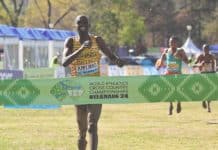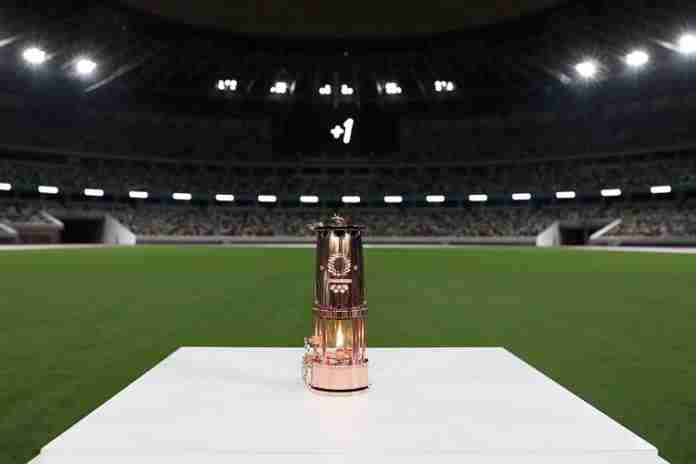(★ Friends: Very grateful to have received 37 donations over the past month toward our server and support costs, covering about 79% of our current bill. But we could use your help to cover the rest; if you wish, please donate here. Thank you. ★)
The latest news, notes and quotes from the worldwide Five-Ring Circus:
● Games of the XXXII Olympiad: Tokyo 2020 ● The Tokyo Games were slated to open on Friday, 24 July 2020, but instead a short program was held inside the new Olympic Stadium to mark one year to go to the postponed Games, now expected to begin on 23 July 2021.
Star swimmer Rikako Ikee (JPN), who has returned to training after taking 10 months off to receive treatment for leukemia, participated as part of a three-minute video (available here).
Said organizing committee President Yoshiro Mori:
“I cannot imagine how athletes set to take centre stage must have felt about the first-ever postponement of the Games.
“Inspired by the beacon of hope that lit up the Olympic Stadium today, the Organising Committee will put forth every effort toward preparing for next year’s Games, ensuring they remain in our memory forever as a symbol of unity and solidarity, as together we work to overcome the challenges of COVID-19.”
● Aquatics ● FINA previously approved a $4.46 million aid package for its national federations, with block grants of $25,000 for the 160 national federations, plus another $460,000 to the continental federations. This money was to be used first for emerging elite athletes and then for coaching, facilities and training expenses.
On Tuesday, FINA announced another $2 million “to athletes selected to participate in the FINA Scholarship Programme, either at FINA Training Centres or at National Federation training facilities.” This brings the total coronavirus aid project to $6.46 million.
The FINA Scholarship Program is especially impressive, described as:
“[to] include 100 athletes from National Federations that do not currently have athletes with Olympic Qualifying Standards – 80 swimmers and 20 divers – and enable intensive training at FINA Training Centres in Senegal [Dakar], Thailand [Phuket], Russia [Kazan], and the United States [Spite Institute in Geneva, Ohio]. Each athlete is eligible for up to $2000 USD monthly for living and training expenses, with world class coaches in outstanding facilities.”
The total amount dwarfs almost all other announced pandemic relief programs from other federations (excepting FIFA, of course). It also appears to work in concert – theoretically anyway – with the elite-swimmer support program from the International Swimming League.
ISL announced a Solidarity Program last April, with payments of $1,500 per month from September 2020 to July 2021 for its contracted swimmers (up to 320 = $5.28 million) and a five-week training and competition program from mid-October to mid-November of this year that will be turned into a television series.
Reuters reported the total package is estimated at “$11 million set aside to cover wages, bonuses, ambassador payments and prize money in a condensed season” with the overall cost as high as $20 million. But that is in the future.
● Athletics ● His 2019 injuries fully healed, Michael Norman went to a small meet in Ft. Worth called the AP Ranch High Performance Invitational on Monday and ran his first 100 m since high school.
Running with roommate Rai Benjamin in heat three, Norman enjoyed a favoring wind of 1.6 m/s and screamed to a win in 9.86, the best in the world for 2020. Benjamin also ran a huge lifetime best of 10.03 in second, ahead of Ronnie Baker (10.23) in third.
Justin Gatlin ran in heat two, but managed only third in a wind-aided 10.83.
Norman hadn’t run a 100 m since high school in 2016 (10.27) and now has sensational lifetime bests of 9.86/19.70/43.45. He’s only the second man in history to run sub-10:00/sub-20.00/sub-44:00: 400 m record holder Wayde van Niekerk (RSA) was the first at 9.94/19.84/43.03.
Norman now ranks no. 8 on the all-time U.S. list, tied with Carl Lewis (1991) and Noah Lyles (2019).
Benjamin’s prior 100 best was 10.69 from 2015 (!) and is close to joining van Niekerk and Norman, with lifetime bests of 10.03/19.99/44.31 … and none of these are close to being his best event!
So what about Norman for Tokyo? He’s going to have to choose; look at the schedule:
Day 2: 100 m heats
Day 3: 400 m heats (a.m.), 100 m semis and finals (p.m.)
Day 4: 400 m semis
Day 5: 200 m heats (a.m.), 200 m semis (p.m.)
Day 6: 200 m final
Day 7: 400 m final
If he tried all three, he’d be running nine races in six days, but wouldn’t the heats be nothing more than training runs?
¶
Kenya was hit with more disciplinary actions by the Athletics Integrity Unit:
● Elijah Manangoi, the 2017 World Champion at 1,500 m and a medal threat for Tokyo, was provisionally suspended for Whereabouts failures. Per the AIU, “the applicable sanction is 2 years’ ineligibility subject to a reduction to a minimum of 1 year depending on your degree of fault.”
● Patrick Siele (2:11:00 marathon ‘19) was provisionally suspended for “Evading Refusing or Failing to Submit to Sample Collection.”
● Kenneth Kiprop Kipkemoi (2:05:44 marathon ‘18) was suspended for two years from 25 February 2020, with his results annulled from 12 September 2019, for the use of the astham treatment Terbutaline.
● Mercy Jerotich (2:26:52 marathon ‘17) was suspended for eight years for use of the steroid metabolite Norandrosterone after previously having a doping positive in 2015.
● James Kibet was suspended for the use of Norandrosterone on 7 July.
World Athletics chief Sebastian Coe (GBR) has noted that the situations in Russia and Kenya are completely different, since the Kenyan doping problem is not state-sponsored. But isn’t it time for a World Athletics task force to be created for Kenya, to better monitor and solve the spread of doping there?
¶
The famed ISTAF meet in Berlin (GER) is scheduled for 13 September in the historic Olympiastadion and the promoters announced Tuesday that they expect to be able to accommodate about 3,500 fans in the stands.
That’s not much in a 74,475-seat stadium, which was expected to have as many as 45,000 in attendance for this year’s meet, but it’s something.
“We are very happy that we can at least allow several thousand fans to attend thanks to our comprehensive safety and hygiene concept,” noted meet director Martin Seeber in a statement.
“Our planning is based on the safety and health of everyone.”
For a meet which usually ranks in the top two annually among worldwide, one-day invitationals, ISTAF is a study in discipline. It dropped from the IAAF Golden League when the Diamond League was formed in 2010 and is now part of the third-tier World Athletics Continental Tour Silver circuit. The result? It can put on the events it wants, on the date it wants, in the manner it wants, and with a budget it can afford.
¶
USA Track & Field announced that an end-of-season “elite event” for 2020 has been abandoned due to the coronavirus pandemic. The statement noted that the decision came after “a unanimous recommendation advising against conducting a large mass gathering event involving travel by participants from all regions of the country” by the Covid-19 Working Group.
● Skiing ● The Federation Internationale de Ski finalized the program for the Nordic World Championships in 2021 in Obertsdorf, Germany, with the large hill event for women added for the first time.
Large hill competitions for women have slowly been added to the FIS World Cup program for several years and the 2021 addition came about in part because the Obertsdorf facility has already hosted large-hill events for women multiple times.
Said German jumping star Katharina Althaus, “The level of performance in our World Cup is definitely high enough so that now is the right time to also have a women’s World Champion from the large hill.”
● Triathlon ● The Endurance Sports Coalition, a trade group of long-distance running, triathlon and similar events has asked the U.S. Congress for additional help during the coronavirus pandemic.
Its letter stated in part, “Mass participation sports can be a key payer in economic recovery. Our events fill hotels and restaurants in all corners of the country, often during off-season when communities need the activity most. They also help raise awareness and tens of millions of dollars for charitable causes large and small.
“Without your help, the hometown races which have become fixtures in many communities may not be there when it is safe to run, bike, swim, and compete in large groups again.”
The worry is that with an estimated 95% of revenue – registrations and sponsorships – drying up due to the pandemic, as many as 80% of all events for 2020 could be canceled and may not be able to return.
● Wrestling ● Amid long lists of canceled events in 2020, USA Wrestling announced that it’s national championships would be held in Coralville, Iowa – near Iowa City – from 9-11 October 2020.
Subject to whatever happens with the coronavirus pandemic in the area, the event will be one of the first to be held in the new Xteam Arena, slated to open in September, with a seating capacity of 5,100.
● Foundation for Global Sports Development ● A total of 10 grants of $10,000 each is being offered to athletes whose training regimens have been disrupted by the coronavirus pandemic.
The application process is all online and the selection criteria are based on the impact of the pandemic on the athlete’s training and competition program, pre-COVID-19 community service efforts and “trajectory to becoming a high-performance athlete.”
The application deadline is 10 August, with the winners to be notified in mid-September.
● International Olympic Committee ● The IOC honored American member Anita DeFrantz with a story noting her ascension to First Vice President of the organization in the aftermath of last week’s IOC Session.
DeFrantz, a bronze medal winner in rowing at the 1976 Olympic Games in Montreal, was on her way to Moscow for 1980 when the U.S. led a boycott in protest of the Soviet invasion of Afghanistan. She sued the U.S. Olympic Committee unsuccessfully, but was recognized by the IOC for her work with the award of the Olympic Order in 1980.
Six years later, and after her successful term as a Vice President of the Los Angeles Olympic Organizing Committee – she led the planning effort for the Olympic Villages – DeFrantz was elected to the IOC in 1986 and to the Executive Board in 1992.
It’s the second time DeFrantz has held this rank; she was also First Vice President during her 1997-2001 term as an IOC Vice President.
“The year 1980 certainly changed my life in many ways. Becoming an IOC Member never crossed my mind, but the path I took led me to that opportunity. For me, to be serving right next to another athlete who was denied the opportunity to compete at those Games means a lot. It means we will never let an athlete be denied that opportunity again. It’s a great responsibility.”
● United States Olympic & Paralympic Committee ● The long-awaited U.S. Olympic & Paralympic Museum will open on 30 July, in Colorado Springs.
The facility spans about 60,000 sq. ft. and will open with 12 galleries to salute American participation in the Games, sating back to 1896. A special exhibition to honor the 1980 team, which did not participate, will be mounted during the opening months.
The Associated Press reported that the facility is projected to cost $91 million, some $15 million more than expected when ground was broken in 2017. Private funding covered $65 million and $26.2 million in support was provided by the Colorado Economic Development Commission.
● Games of the XXII Olympiad: Moscow 1980 ● The IOC’s list of doping violations for each Olympic Games held since testing began in 1968 skips the Moscow Games of 1980 entirely.
According to the document, there were no positives. According to a story on the Current Time network (run by Radio Free Europe/Radio Liberty), we now know why:
“Soviet athletes and former members of the KGB allege that the Soviet authorities were using dirty tricks to boost performances while maintaining the appearance of a clean competition”
and
“the Soviet authorities allegedly oversaw a broad effort to tamper with athletes’ drug tests.”
A KGB department was set up to ensure that there would be no doping violations, and substituted clean specimens in place of all athlete samples:
“Konstantin Volkov, who won a silver medal in the pole vault for the Soviet Union at the 1980 games, told Current Time that when it came time to hand in his urine sample for testing, an employee at the Moscow lab informed him that ‘we throw all this out’ and handed him a different container already filled with urine.
“’I said, ‘Well, I don’t have anything [in my urine]. I’m not scared,’ according to the 60-year-old Volkov. But the former pole vaulter said the lab employee insisted that ‘we don’t need accidents, so go turn this one in.’
“When asked if other athletes, including from the 70 other countries competing in the games, were doing the same, the lab employee confirmed that they were.
“’Yes, everyone is the same; no exceptions,’ Volkov recalled the lab employee saying. ‘No one will have anything [in their samples].’”
And they didn’t. Volkov was also told to take part in a doping program to ensure his success at the Games, but refused since he was not sure how the drugs would affect him in his event.
Not at all surprising. And the Soviets had prepared an elaborate doping program to ensure they would win the most medals in Los Angeles in 1984, but never got the chance, as the USSR boycotted the Los Angeles Games in retaliation for 1980.




















